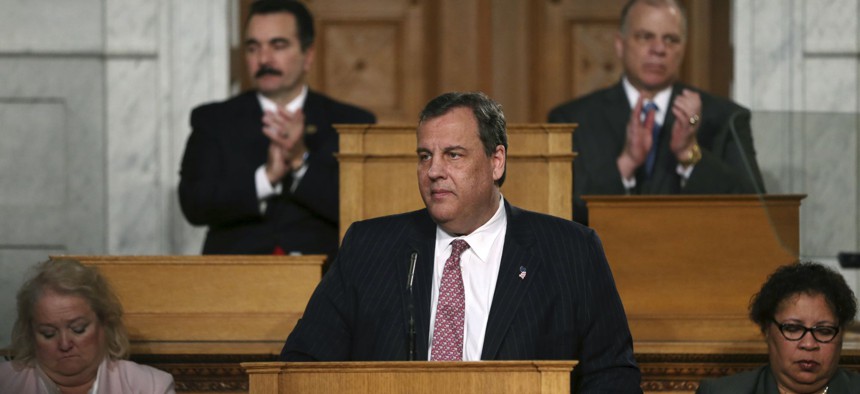Chris Christie: ‘Arresting, Jailing, Stigmatizing the Victims Will Not Make It Better’

New Jersey Gov. Chris Christie delivers his State of the State Address at the State Assembly on Tuesday, Jan. 10 in Trenton. Mel Evans / AP Photo

Connecting state and local government leaders
In his State of the State Address, the New Jersey governor laid out plans to address drug abuse and the ongoing opioid epidemic.
New Jersey Gov. Chris Christie pledged Tuesday to make combating drug abuse and addiction in the state a top priority during his last year in office.
During his State of the State address, the Republican governor noted that drug overdose deaths went up nearly 22 percent in New Jersey between 2014 and 2015. This increase, he added, was largely due opioids—drugs that include prescription painkillers and heroin.
In 2015, the governor said, about 1,600 people died due to drug use in New Jersey, more than four-times the number of people murdered in the state.
Calling drug addiction a “disease,” Christie said, “arresting, jailing, stigmatizing the victims will not make it better.”
He laid out a raft of proposals to help address drug-related problems. Some of these included a website and hotline meant to make it easier for people to access treatment, funding for behavioral health providers, and changing age restrictions so Department of Children and Families licensed residential facilities can treat 18-and 19-year-olds.
The governor also called on state lawmakers to pass legislation in the next 30 days that would mandate that insurers cannot deny coverage for the first six months of inpatient or outpatient drug rehabilitation treatment.
And Christie said he would direct the state’s Attorney General, Christopher Porrino, to use emergency rulemaking and other regulatory changes to limit the supply of opioid pain medications that doctors and other healthcare providers can prescribe to patients for acute pain.
Current state rules allow for initial prescriptions that can provide up to a 30-day supply of the painkillers. Christie’s preference is for that limit to be five days at the beginning of treatment.
At one point in his remarks, the governor cited a report from the U.S. surgeon general linking the use of alcohol and illicit drugs by people at younger ages to increased rates of addiction.
He then gave a warning to advocates of legalizing recreational marijuana.
“I hope, I pray, that this will give pause to those who are blindly pushing ahead to legalize another illicit drug in our state for tax revenue, or by falsely saying it will cause no harm,” he said.
Christie is in the final stretch of his second four-year term as governor. He will have to leave office due to a provision in New Jersey’s state constitution that disqualifies him from serving a third consecutive term. The governor’s favorability ratings remain low. Poll results released in December showed only 18 percent of registered voters approved of Christie’s job performance.
The governor has been dogged by a scandal involving the 2013 closure of access lanes for the George Washington Bridge, which connects New York City and New Jersey. The episode led to court convictions of two of his former allies in November. Christie himself has not faced charges.
After dropping out of the Republican presidential primary last year, Christie became a booster of President-elect Donald Trump. He was at one point considered a contender for key posts in the Trump administration, but it now appears all but certain he has been passed over.
New Jersey is not alone grappling with an upswing in opioid addiction and deaths.
The drugs have taken a heavy toll in states around the U.S., such as West Virginia, New Hampshire, Kentucky and Ohio.
Similar to Christie on Tuesday, former Vermont Gov. Peter Shumlin, a Democrat, devoted most of his 2014 State of the State message to discussing the state’s opioid epidemic.
Bill Lucia is a Senior Reporter for Government Executive’s Route Fifty and is based in Washington, D.C.

NEXT STORY: Where Gerrymandering Is Containing City Power





